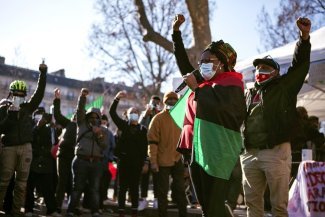Lying on a bed in her apartment in the south-eastern Turkish city of Diyarbakır, Leyla Güven struggles to sit up. Fatigued by the effort, she takes her daughter Sabiha Temizkan by the hand, and gives her a warm smile. On the day she allows Equal Times to visit her in March, Güven – a Kurdish politician, Member of Parliament for Hakkâri for the Peoples’ Democratic Party (HDP) and human rights activist – is on the 158th day of a hunger strike. Her protest began in on 8 November 2018 to call for the end of the isolation of Abdullah Öcalan, the leader of the PKK (Kurdistan Workers’ Party), who has been serving a life sentence on the island prison of İmralı since 1999.
Supporters say the condition of his imprisonment is a violation of international human rights law, specifically the ‘Mandela Rules’ which deem confinement for more than 22 hours a day on more than 15 consecutive days without human contact as ‘prolonged solitary confinement’.
“The Turkish government has tried to manipulate my mother’s demand and make it look like a fight for Öcalan’s freedom,” says Sabiha, a journalist who speaks on her mother’s behalf; Güven must conserve the little energy she has to survive.
“This is not about Öcalan’s release, but about ending his isolation. He cannot see his lawyer or his family.” Öcalan last saw his lawyers in July 2011; his brother Mehmet Öcalan, a member of the pro-Kurdish Peace and Democracy Party (BDP), became the first member of his family to visit the PKK leader since 2015 in January this year.
After being forced to marry at 16, Güven had Sabiha, when she was 17. At the beginning of the 1990s, divorced and with two children to raise, Güven (now 55 years old) began her political career as a member of the administrative council of the Kurdish nationalist party HADEP (the People’s Democracy Party), which was eventually banned in 2003 for its alleged support of the PKK.
In 2004, Güven was elected mayor of Küçükdikili, a village in the southern city of Adana, and in 2009, she was voted mayor of the south-eastern market town of Viranşehir. From 2010 to 2014, she spent four years in detention following a crackdown on Kurdish politicians by the government of Abdullah Gül, and in the June 2018 presidential and parliamentary elections Güven was elected as a member of parliament for HDP.
However, prior to the elections, Güven had been returned to prison in January 2018 as one of nearly 500 people arrested for criticising ‘Operation Olive Branch’, a Turkish military operation in the Afrin area of northern Syria that involved the expulsion of the Kurdish fighting force YPG, a group considered as ‘terrorists’ by the Ankara government. This operation also resulted in the death and displacement of vulnerable civilians at the hands of the Turkish military. Güven, who is also co-chair of the Democratic Society Congress (DTK), a platform of Kurdish associations that promote democratic confederalism, was facing 31 years in prison on charges of terrorism and hate speech. Despite having immunity from prosecution as a parliamentarian, Güven was only released from prison on 25 January 2019, almost three months after she began her hunger strike.
Currently, ten HDP members of parliament remain in prison, including Selahattin Demirtaş and Figen Yüksekdağ, formerly HDP co-chairs. In the last year, more than 200 detainees from prisons across Turkey have joined Güven’s action and declared a hunger strike, but international outcry has been muted. “Except for Amnesty International, no other organisation has contacted us or commented on this issue,” says Sabiha. Güven has sent letters to the European Committee for the Prevention of Torture (CPT) and to the European Parliament explaining the purpose of her indefinite hunger strike, but she is yet to receive an answer.
Sabiha says she learnt of her mother’s decision along with everyone else. “She wanted to carry out the [hunger] strike on her own, because she thought she could achieve more as a deputy – especially as an imprisoned member of parliament.”
Since Güven’s release from prison, her daughter says that “the pro-government media tried to make people believe that with the release of my mother the strike was over,” but she now continues her protest with the support of her loved ones. Surviving only on salt, water and vitamins, her health deteriorates every day, but she is determined to carry on until justice is done. As she said by way of explaining her intentions for the strike: “If necessary, I will lead this protest to the death.”

Leyla Güven lies on the bed in her apartment in Diyarbakir, on 9 March 2019. She has been on hunger strike since 8 November 2018.
Although Güven’s protest has drawn support from the Kurdish community and global human rights icons such as Leila Khaled and Professor Angela Davis, the wider international community has remained largely silent. Close to 200 people are currently on hunger strike in Turkish prisons, and in Europe, 15 Kurdish activists and political figures are on indefinite hunger strike in Strasbourg to protest the CPT’s failure to visit PKK leader Abdullah Öcalan. Other hunger strikes in support of Öcalan are taking place as far afield as Syria, Iraq, Wales and Armenia.

Güven, who began her protest in prison and continues it back at home, survives only on water, salt and vitamin supplements.
Güven, 55, was elected an HDP member of parliament for Hakkâri (on the Turkish-Iraqi border) in the 24 June 2018 presidential and parliamentary elections, but she had been in prison since January of that year for statements against the Turkish military operation in Afrin. Since beginning her hunger strike, she has been suffering from diarrhea, fever and insomnia brought on by body pains. Her muscle and lean body tissue has also been wasting away.

Güven is assisted by her oldest daughter, the journalist Sabiha Temizkan (right), who currently cares for her mother full-time, and a friend.
In an English version of an interview originally published by the Yeni Yaşam newspaper and republished by The Region, Sabiha spoke of her love and devotion for her mother but also how difficult it is being the daughter of a ‘folk heroine’. “It is really hard. Although I respect my mother’s actions, I sometimes can’t stop saying, ‘Why did she do this?’ Maybe it’s selfish, but sometimes I think, ‘Why it is always my mother?’ The whole family is worried. We’re trying to do everything in our power to get through this process without being hurt. We struggle to protect our hope. [But this is] one of the most desperate moments I’ve ever had.”

Sabiha sits besides her mother, the Kurdish MP and human rights activist Leyla Güven.
Partly due to their small age difference (17 years), Güven and her daughter Sabiha have always had a very close relationship. Sabiha witnessed all the steps in her mother’s development as a woman, as an activist and as a politician. “I was going to middle school and my mum was going to party meetings. There was no more mother cooking in the kitchen; she became a very active political woman.”
When she expressed her concern for her mother’s health, Güven reminded her daughter of Taybet Ana, who was killed during the curfew in Silopi and whose body remained unburied for a week, or Cemile from Cizre, who was shot dead by the police. Both people were civilians caught in crossfire during the curfew imposed in 2015 to conduct military operations. Turkish security forces tried to flush out Kurdish militants and violent clashes happened in various towns of south-east Turkey. “‘My life is not more precious than theirs,’ she told me.”
However, that does not mean that Sabiha is comfortable with her mother’s choice. “My mother’s decision hurts me, but I cannot stay indifferent, even if she puts Öcalan in the middle of the matter. My intention is not to stand in her way, but besides her,” she explains in tears. “When you are the daughter of such a strong woman, you learn to be strong for her.”

Güven is assisted to take a walk around the house to help relieve muscle pains and to prevent blood clots.
Every day, early in the morning, Güven’s blood pressure, fever and weight is observed. Throughout the day, Sabiha assists her mother, keeping her company, reading her articles and even tweeting about her. Güven also receives many visitors and gifts. People write her poems, songs, letters of thanks, and even send her handmade bracelets and earrings.

Due to the severe headaches, Güven is unable to sleep properly and is usually somewhere between sleep and wakefulness.
Except for Amnesty International, very few international organisations have established contact with Güven’s family or made public comment on her condition. But she remains unbowed. At the beginning of her hunger strike in November, Güven issued the following statement: “Today, the policy of isolation against Mr Öcalan is imposed not only on him, but – in his personage – on society as a whole. Isolation is a crime against humanity. I am starting an indefinite hunger strike to protest against Mr Öcalan’s isolation. I won’t be defending myself in court from now on. I will continue to protest until the judiciary has ended its illegal decisions and until this isolationist policy has ended. If necessary, I will lead this protest to the death.”
As of today (23 April 2019), Leyla Güven has been on hunger strike for 167 days.











